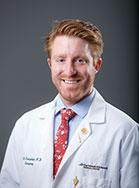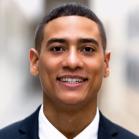Class of 2022
Matthew Carroll, MD
Matthew Carroll is a PGY3 general surgery resident interested in Acute Care/Trauma Surgery. During his professional development time, he was mentored by Dr. Richard Barth and Dr. Matthew Roginski.
Dr. Carroll entered his research year with 4 areas of interest:
Quality improvement
Dr. Carroll worked on multiple ongoing Quality Improvement projects. One of these projects examines sedation practices of DHART (Dartmouth Hitchcock Advanced Response Team). In a research component of this project, he investigated the level of sedation patients receive during helicopter transport and how this affects long-term outcomes. The second phase of this project will involve implementing practice guidelines to standardize patient sedation. To better understand the DHART team's function and current practices, Dr. Carroll flew with the team on several missions over a month.
Rural general surgery and acute care/trauma
Dr. Carroll explored his interest in General Surgery by developing a General Surgery Needs Assessment for Maine, New Hampshire, and Vermont. This survey will help establish the anticipated need for general surgeons in these predominantly rural states. Lastly, he conducted a meta-analysis to understand the long-term benefit of preoperative MRI in patients with newly diagnosed breast cancer. He found that pMRI did not reduce rates of in-breast-tumor-recurrence.
Surgical education
Dr. Carroll was fortunate to join two projects focused on surgical education and improvement. In 2020, Robert Shaw and Casey Lamb spearheaded the development of a curriculum for 4th-year medical students in their surgical sub-internships. The curriculum was delivered during didactic sessions embedded within their rotation to better prepare the medical students to be surgical interns. A research component of this project showed that following the completion of the didactic curriculum, the students felt better prepared across multiple competencies. This project allowed Dr. Carroll to develop his teaching skills outside of a clinical setting. It also allowed him to cultivate a mentorship relationship with several students and to continue to be a part of their education beyond the scope of this curriculum. In 2022, he was awarded the Thomas P. Almy Award for Education by the graduating medical school class. Additionally, he is completing a research project evaluating the expectations of 3rd year medical regarding their surgical clerkships. Hopefully, the results of this study can be used to guide curricular improvements and identify existing barriers.
Peter Congelosi, MD
Dr. Peter Congelosi came into his professional development year as a PGY3 general surgery resident with no prior research experience. His goal was to gain experience in conducting all steps of a research project from conception to publication. His primary research mentors were Dr. Meredith Sorensen and Dr. Sandra Wong.
Dr. Congelosi's research interests centered around health communication, particularly the impact of the Information Blocking Rule on patients and providers.
Health communication
Dr. Congelosi first completed a project that looked at providers' perceptions of the patient health portal before and after the implementation of the Information Blocking Rule in 2021, which allowed patients immediate access to their pathology, imaging, and operative reports for which there had previously been a delay.
Dr. Congelosi was interested in whether or not there was a change in patient and provider communication and provider time spent on the electronic health record. He also wrote a scoping review on patient numeracy and surgery to summarize the available research. This project was particularly rewarding as he learned how to conduct a peer-reviewed search of electronic databases and follow meta-analysis protocols to construct the manuscript. He also wrote an editorial that was published in General Surgery News, which discussed the potential effects of the Information Blocking Rule on provider workload and patient stress.
Xavier Fowler, MD
Dr. Xavier Fowler is a PGY3 general surgery resident completing two years of professional development time, the first of which includes a position as the surgical VA CRQS fellow.
His primary research mentors were Dr. Philip Goodney, Dr. David Soybel, and Dr. Matthew Wilson. Dr. Fowler's experience centered on projects related to patient quality and safety, epidemiology and biostatistics training, and the disruptions in care due to COVID-19.
Patient quality and safety
Dr. Fowler's first year of research was sponsored through the VA Chief Resident in Quality and Safety (CRQS) Fellowship program. As a CRQS Fellow, Dr. Fowler participated in weekly curriculum focused on principles of high reliability organizations, systems change, and leadership and management tactics. Additionally, this program included Six-Sigma Yellow belt training followed by a QI capstone project. For his capstone project, Dr. Fowler designed and executed a project to reduce surgical site infections at the White River Junction VA Medical Center.
Epidemiology and biostatistics
Dr. Fowler took advantage of the opportunity to audit a series of introductory research courses at The Dartmouth Institute, which provided a foundation in research design and interpretation, as well as an introduction to epidemiology and biostatistics, including training in statistical analysis software, such as STATA. In a practical application of this training, Dr. Fowler worked on a mulit-center project to evaluate the accuracy of amputation data recorded in the Vascular Quality Initiative (VQI) – a vascular surgery registry which captures surgeries and outcomes from hundreds of centers across the country.
Disrupted Care National Project
Dr. Fowler joined a multi-disciplinary team led by Dr. Louise Davies and funded by a grant from the VA, to study the ways in which the COVID-19 pandemic disrupted healthcare in the Veteran population. Dr. Fowler's contributions centered on examining changes in volume of surgical procedures performed before and during the pandemic using Medicare claims data.
Robert Shaw, MD
Robert Shaw is a PGY3 general surgery resident engaged in the Surgical Education Research Fellowship. He has dedicated 2-years to research starting in June 2020. His research mentors included Dr. Joga Ivatury, Dr. Matthew Wilson, Dr. Kari Rosenkranz, Dr. Sandra Wong, and Dr. Meredith Sorensen.
Dr. Shaw gained skills and knowledge in research methodologies, statistical analyses, curriculum design, scientific writing, and clinical trials.
Surgical education
Dr. Shaw started his second research year, continuing to focus on surgical education. He completed the Surgical Education Research Fellowship (SERF), a year-long program in conjunction with the ASE which focuses on preparing fellows to conceive, plan, and bring to fruition novel research projects that will enhance surgical education. With Dr. Brigitte Smith's mentorship, he successfully completed a multi-institutional survey of 9 academic general surgery programs and identified key barriers in robotic surgery training for general surgery residents. This work was presented at the annual SERF Forum and has been published in the Journal of Surgical Education.
Colorectal surgery
Dr. Shaw also studied patient-reported outcomes in patients undergoing colorectal surgery. With his mentors, Dr. Ivatury and Dr. Wilson, he explored many different patient populations including those with anal cancer, the impact of mental health on patient outcomes, and comparing patient reported outcomes based on surgical approach. His presentation on the impact of mental health on Enhanced Recovery After Surgery protocols at the annual STARS symposium won 2nd place. This work was subsequently presented at the American College of Surgeons and the Tripartite annual meetings. Additionally, Dr. Shaw has been involved in two clinical trials looking at prophylactic mesh implantation during ileostomy reversal. He presented the results of the first clinical trial at the New England Surgical Society Annual Resident and Fellow Research Day and won 1st place. This work was subsequently presented at the New England Surgical Society annual meeting.



